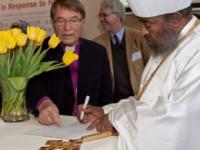
Rev. Gunnar Stålsett, Bishop Emeritus of the Church of Norway (right) with His Holiness Abune Paulos signing the personal commitment to action at the Summit of High Level Religious Leaders on the Response to HIV. 22-23 March, The Netherlands.
Credit: UNAIDS
A Summit of High Level Religious Leaders on the Response to HIV took place in The Netherlands from 22 to 23 March. The meeting explored opportunities for religious leaders to promote universal access to HIV prevention, treatment, care and support in their communities and speak out against stigma and discrimination affecting people living with HIV. It brought together some 40 Baha’í, Buddhist, Christian, Hindu, Jewish, Muslim and Sikh leaders together with the Executive Directors of the Joint United Nations Programme on HIV/AIDS (UNAIDS) and the United Nations Population Fund (UNFPA), the AIDS Ambassadors of The Netherlands and Sweden, leaders and representatives of networks of people living with HIV and other organizations active in the response to HIV.
Speaking at the opening ceremony, UNAIDS Executive Director Michel Sidibé said, "As I travel the world, I see increasing evidence of social injustice. Growing economic disparities, inequality and social injustice stalk the earth. The greatest impact is felt by the poorest segments of society, on women and girls and on the marginalized. Social injustice only serves to increase the vulnerability of the vulnerable and push them farther out of reach of HIV services. I sincerely hope that this meeting will produce a call for action to make these services available and virtually eliminate mother to child transmission of HIV. Nothing would be more noble than a world with no more babies born with HIV."
I sincerely hope that this meeting will produce a call for action to make these services available and virtually eliminate mother to child transmission of HIV. Nothing would be more noble than a world with no more babies born with HIV.
UNAIDS Executive Director Michel Sidibé
During the Summit, participants addressed the realities of how stigma and discrimination are perpetuated both in religious communities and society at large. They identified best practices to strengthen the voice and action of religious leaders and bring about collaboration among different faiths and with other sectors involved in the response to HIV.
“The leaders gathered at this summit have the ability to inspire and empower change – within their own communities, across countries, and throughout wider communities,” said Rev. Dr. Richard Fee, Chair of the Board of Directors of the Ecumenical Advocacy Alliance and General Secretary, Life and Mission Agency, Presbyterian Church in Canada. “In the midst of what appears to be ‘AIDS fatigue” they have the potential to galvanize efforts against a disease that continues to spread, driven by silence, fear, violence and injustice.”
Since the beginning of the HIV epidemic, religious communities, mosques, temples, churches, hospitals and clinics have reached out to provide support to those living with and affected by HIV. Strengthening their leadership can greatly influence the lives of many people, and leaders speaking out responsibly about AIDS can make a powerful impact at both community and international level.
"Participants affirmed in their concluding statement the "renewed sense of urgency" to prioritize and strengthen the response to HIV. Such response includes "holistic prevention" in addition to reaching universal access to treatment, care and support. The statement called for the "Universal respect for the human rights of all people living with and affected by and at risk of HIV infection" and the "respect for the dignity of every human being". Leaders also called for "a massive social mobilization" to support services for women to eliminate the transmission of HIV from mother to child.
In addition, religious leaders drafted and personally signed a pledge to commit themselves to strengthened efforts to respond to HIV. The pledge includes "deepening meaningful engagement with people living with HIV" and "acting decisively to protect human rights within my faith community; through collaboration among other religious leaders of different faiths; and by influencing local, national, regional and global decision-making processes on HIV."
Dr Thoraya Ahmed Obaid, Executive Director of UNFPA, in her closing remarks said, "Our work together proves that interventions can be successful and sustainable if change is inclusive, if it emerges from within the faith and cultures of the people themselves, if people of all age groups living with (or without) HIV are secure in their sense of belonging and are fully engaged, and all partners are equally valued and respected."
The co-chairs of the event were His Holiness Sri Sri Ravi Shankar, Founder of the Art of Living Foundation; Rabbi David Rosen, Director of Interreligious Affairs of the American Jewish Committee; Ms. Nyaradzayi Gumbonzvanda, General Secretary of the World YWCA; and the Right Rev. Gunnar Stålsett, Bishop Emeritus of the Church of Norway.
The Summit was organized by the Ecumenical Advocacy Alliance and Cordaid, with support from the Dutch Ministry of Foreign Affairs, UNAIDS, International Network of Religious Leaders Living with or Personally Affected by HIV or AIDS (INERELA+), the World AIDS Campaign and the European Council of Religious Leaders (Religions for Peace).




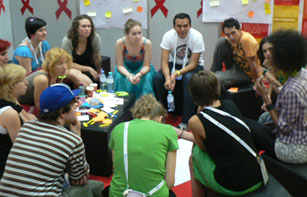
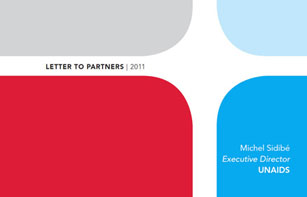




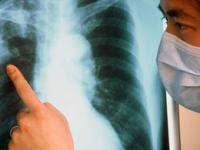 Preventing people living with HIV from dying of tuberculosis is one of the 10 priority areas outlined in the UNAIDS Outcome Framework for the period 2009-2011. Credit: UNAIDS/P.Virot
Preventing people living with HIV from dying of tuberculosis is one of the 10 priority areas outlined in the UNAIDS Outcome Framework for the period 2009-2011. Credit: UNAIDS/P.Virot


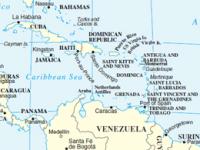
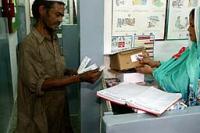 A review carried out by the 2009 Reference Group to the UN on HIV and Injecting Drug Use concludes that coverage of HIV prevention, treatment, and care services for injecting drug users (IDUs) worldwide is very low and unlikely to be sufficient to prevent, halt, or turn around HIV epidemics. Credit: UNAIDS/P.Virot
A review carried out by the 2009 Reference Group to the UN on HIV and Injecting Drug Use concludes that coverage of HIV prevention, treatment, and care services for injecting drug users (IDUs) worldwide is very low and unlikely to be sufficient to prevent, halt, or turn around HIV epidemics. Credit: UNAIDS/P.Virot